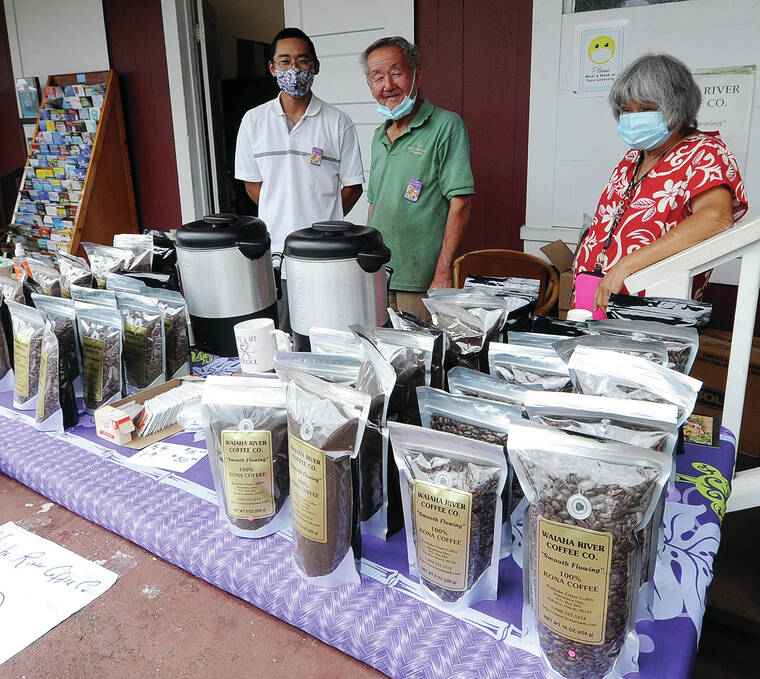Coffee bill awaits Senate hearings

Laura Ruminski/West Hawaii Today The Kunitake family displays their Waiaha River Coffee Saturday at the Holualoa Village Coffee and Art Stroll.
Coffee farmers are cautiously optimistic that a measure to set tighter limits on using Hawaii location names to sell coffee will be passed this legislative session.
Coffee farmers are cautiously optimistic that a measure to set tighter limits on using Hawaii location names to sell coffee will be passed this legislative session.
House Bill 1517, which would require coffee blend labels to disclose geographic and regional origins and percentage by weight of the blended coffees, has completed its journey through the state House and crossed over to the Senate where it is awaiting the first of two hearings before joint committees in that chamber.
ADVERTISING
The proposed measure, introduced by Rep. Nicole Lowen, D-North Kona, among others, would also prohibit using geographic origins of coffee in labeling or advertising for roasted or instant coffee that contains less than a certain percentage of coffee by weight from that geographic origin, phased in to a minimum of 51%.
It further would disallow use of the term “All Hawaiian” in labeling or advertising for roasted or instant coffee not produced entirely from green coffee beans grown in Hawaii. Funds for the state’s pesticides subsidy program are also tacked on.
Currently, state law allows distributors to use Hawaii names, such as Kona, Kauai or Ka‘u, on products that include as little as 10% of coffee from the named region. The state law, first passed in 1991 to protect Kona coffee was expanded to all Hawaiian grown coffee in 2001. Efforts since to increase the minimum percentage have been unsuccessful through a measure in 2019 came close, but died in its final Senate committee.
This begs the question, what’s different about this year, and can growers get this measure passed?
According to Suzanne Shriner, President of Kona Coffee Farmers Association, COVID-19 is what’s different.
“We learned a lot these past two years,” she said. “When our market shut down, what most farmers saw was that sales went up because the work-from-home crowd wanted quality coffee. So we were forced to have a market study for the past two years. … We didn’t necessarily expect that (change in the market), which means, we need more higher quality products from Kona coffee. There’s a lot of room for growth and 10% holds us back.”
In 2021-22, the value of the 26.7 million pounds of coffee cherry produced was $60.05 million, according to a U.S. Department of Agriculture National Agricultural Statistics Service coffee report released Jan. 21.
Green coffee, which is beans that have been milled but not roasted, commanded $21.70 per pound, putting the value of the industry at over $113 million. Post-roast, Kona coffee sells on the Big Island around $40 to $45 per pound.
According to the National Agricultural Statistics Service, coffee utilized production was up 17% from last season with a forecast of 26.7 million pounds of cherry for the 2021-22 season. Bearing acreage totaled 7,100 acres, up 300 acres from the previous year, with an average yield at 3,820 pounds of cherry per acre, up 310 pounds.
The 2021-22 value was up from $48.38 million in 2020-21 and $54.3 million in 2019-20.
Hawaii remains the largest producer of coffee in the United States. According to the 2017 Census of Agriculture, which is conducted every five years, more than half of the 9,300 acres of coffee planted in Hawaii is growing on the Big Island. Further, over 85% of the state’s 1,577 coffee farmers operate on the state’s southern-most island home.
For Bruce Corker, a Kona coffee farmer and KCFA board member, the bill should’ve been passed a long time ago.
“It’s gonna do two things that should’ve happened a long time ago,” he said. “It’s going to help protect the reputation of Hawaiian grown coffees from the damage that’s caused from putting Kona name on inexpensive, imported coffee. And, it’ll put money into the pockets of farmers that formerly went to the mainland for roasters that market this.”
However, Corker remains skeptical about whether coffee farmers will get proper representation in the Senate this year.
“The Senate has always been the problem,” he said.” “But we’re hopeful senators like Dru Kanuha (D-Kona, Ka‘u) can actively represent their constituents.”
Kanuha said this week that he supports the bill protecting coffee farmers within the district he represents. Kanuha is a member of the Senate Committee on Ways and Means, which controls the state’s purse strings.
“I have been a long-time supporter of the Kona Coffee industry’s efforts to establish a 51% minimum for Hawaii-grown coffee blends and will continue to voice my support to the respective chairs,” Kanuha said.
To remain alive this session, House Bill 1517 must secure a hearing and pass a joint committee on Agriculture and Environment and Energy and Environmental Protection by March 23 before being heard by a joint committee on Ways and Means and Commerce and Consumer Protection.


